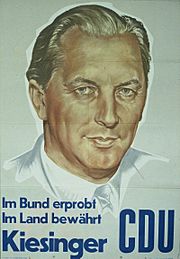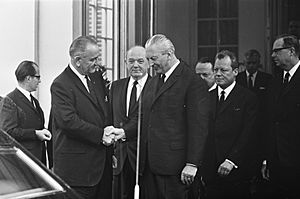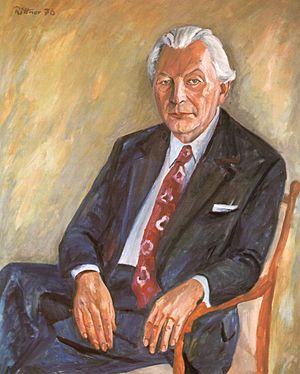Kurt Georg Kiesinger facts for kids
Quick facts for kids
Kurt Georg Kiesinger
|
|||||||||||||||||||||||||||||||||||||||
|---|---|---|---|---|---|---|---|---|---|---|---|---|---|---|---|---|---|---|---|---|---|---|---|---|---|---|---|---|---|---|---|---|---|---|---|---|---|---|---|
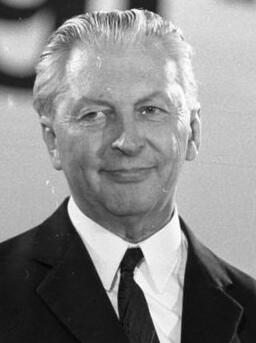
Kiesinger in 1969
|
|||||||||||||||||||||||||||||||||||||||
| Chancellor of Germany | |||||||||||||||||||||||||||||||||||||||
| In office 1 December 1966 – 22 October 1969 |
|||||||||||||||||||||||||||||||||||||||
| President | Heinrich Lübke Gustav Heinemann |
||||||||||||||||||||||||||||||||||||||
| Vice Chancellor | Willy Brandt | ||||||||||||||||||||||||||||||||||||||
| Preceded by | Ludwig Erhard | ||||||||||||||||||||||||||||||||||||||
| Succeeded by | Willy Brandt | ||||||||||||||||||||||||||||||||||||||
| Leader of the Christian Democratic Union | |||||||||||||||||||||||||||||||||||||||
| In office 23 May 1967 – 5 October 1971 |
|||||||||||||||||||||||||||||||||||||||
| General Secretary | Bruno Heck | ||||||||||||||||||||||||||||||||||||||
| Preceded by | Ludwig Erhard | ||||||||||||||||||||||||||||||||||||||
| Succeeded by | Rainer Barzel | ||||||||||||||||||||||||||||||||||||||
| Minister-President of Baden-Württemberg | |||||||||||||||||||||||||||||||||||||||
| In office 17 December 1958 – 1 December 1966 |
|||||||||||||||||||||||||||||||||||||||
| Deputy | Hermann Veit Wolfgang Haußmann |
||||||||||||||||||||||||||||||||||||||
| Preceded by | Gebhard Müller | ||||||||||||||||||||||||||||||||||||||
| Succeeded by | Hans Filbinger | ||||||||||||||||||||||||||||||||||||||
| President of the Bundesrat | |||||||||||||||||||||||||||||||||||||||
| In office 1 November 1962 – 31 October 1963 |
|||||||||||||||||||||||||||||||||||||||
| First Vice President | Hans Ehard | ||||||||||||||||||||||||||||||||||||||
| Preceded by | Hans Ehard | ||||||||||||||||||||||||||||||||||||||
| Succeeded by | Georg Diederichs | ||||||||||||||||||||||||||||||||||||||
| Leader of the CDU/CSU group in the Bundestag | |||||||||||||||||||||||||||||||||||||||
|
Acting
|
|||||||||||||||||||||||||||||||||||||||
| In office 9 May 1973 – 17 May 1973 |
|||||||||||||||||||||||||||||||||||||||
| First Deputy | Richard Stücklen | ||||||||||||||||||||||||||||||||||||||
| Whips | Leo Wagner Rudolf Seiters Wilhelm Rawe Olaf Baron von Wrangel Paul Mikat |
||||||||||||||||||||||||||||||||||||||
| Preceded by | Rainer Barzel | ||||||||||||||||||||||||||||||||||||||
| Succeeded by | Karl Carstens | ||||||||||||||||||||||||||||||||||||||
|
|||||||||||||||||||||||||||||||||||||||
| Personal details | |||||||||||||||||||||||||||||||||||||||
| Born |
Kurt Georg Kiesinger
6 April 1904 Ebingen, Württemberg, German Empire |
||||||||||||||||||||||||||||||||||||||
| Died | 9 March 1988 (aged 83) Tübingen, Baden-Württemberg, West Germany |
||||||||||||||||||||||||||||||||||||||
| Political party | CDU (1946–1988) Nazi Party (1933–1945) |
||||||||||||||||||||||||||||||||||||||
| Spouse |
Marie-Luise Schneider
(m. 1932) |
||||||||||||||||||||||||||||||||||||||
| Children | 2 | ||||||||||||||||||||||||||||||||||||||
| Occupation | Lawyer | ||||||||||||||||||||||||||||||||||||||
| Signature | |||||||||||||||||||||||||||||||||||||||
Kurt Georg Kiesinger (born April 6, 1904 – died March 9, 1988) was an important German politician. He served as the Chancellor of West Germany from 1966 to 1969. Before becoming Chancellor, he was the Minister-President of Baden-Württemberg from 1958 to 1966. He also led the Christian Democratic Union (CDU) political party from 1967 to 1971.
Kiesinger became a lawyer in 1933 and worked in Berlin. He joined the Nazi Party in 1933, but he was mostly an inactive member. To avoid being called into the army, he started working at the German Foreign Office in 1940. There, he became a deputy head of the broadcasting department. Some colleagues even reported him for being against the Nazis. After World War II, in 1946, he joined the Christian Democratic Union. He was elected to the Bundestag (the German parliament) in 1949 and served there for many years. He left federal politics for eight years to lead the state of Baden-Württemberg. Later, he became Chancellor by forming a "grand coalition" with the Social Democratic Party (SPD), led by Willy Brandt.
Kiesinger was known as a great speaker and a good mediator. People even called him "King Silver Tongue." He also wrote poetry and books. As Minister-President of Baden-Württemberg, he helped start the University of Konstanz and the University of Ulm. However, Kiesinger's past connection to the Nazis was controversial. Many people, especially student groups, felt that his political role showed that Germany had not fully dealt with its past.
Contents
Early Life and Nazi Connections
Kurt Georg Kiesinger was born in Ebingen, which was then part of the Kingdom of Württemberg. His mother was Catholic and his father was Protestant. His mother passed away when he was very young. His grandmother played a big role in his upbringing and encouraged him a lot.
Kiesinger studied law in Berlin and worked as a lawyer from 1935 to 1940. He joined the Nazi Party in February 1933. However, he stated that he was not very active in the party. In 1940, he was supposed to join the army, but he avoided this by getting a job in the Foreign Office. He quickly became a deputy head of the broadcasting department. This department worked closely with the Nazi Propaganda Ministry. After the war, he was held by American forces for 18 months because of his connection to the Nazi government, but he was later released.
A journalist named Beate Klarsfeld pointed out Kiesinger's close ties to high-ranking Nazi officials. She claimed that Kiesinger was mainly responsible for the content of German international broadcasts. These broadcasts included messages that were against Jewish people and promoted the war. She also said he worked with SS officials who were involved in terrible crimes. Even after knowing about the mass murder of Jewish people (the Holocaust), Kiesinger continued to produce propaganda. These claims were based on documents about Nazi war criminals.
Starting a Political Career
Kiesinger joined the Christian Democratic Union (CDU) in 1946. He taught law students and later started working as a lawyer again. In 1947, he also became a secretary-general for the CDU in his region.
In the federal election in 1949, he was elected to the Bundestag (German parliament). He served there until 1958 and then again from 1969 to 1980. He was known for his excellent speaking skills and his deep understanding of foreign affairs. Even though he was well-respected in his party, he was not chosen for cabinet positions in the federal government. Because of this, he decided to move from national politics to state politics.
Leading Baden-Württemberg
Kiesinger became the Minister-President of the state of Baden-Württemberg on December 17, 1958. He held this position until December 1, 1966. As Minister-President, he also served as the President of the German Bundesrat (Federal Council) for a year. During his time leading Baden-Württemberg, he helped establish two new universities: the University of Konstanz and the University of Ulm.
In the early years of West Germany, it was common for states to have large coalitions of different parties. Kiesinger first led a coalition of the CDU, SPD, FDP, and BHE until 1960. After that, he led a coalition of the CDU and FDP until 1966.
Becoming Chancellor
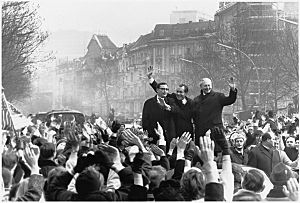
In 1966, the government coalition broke apart. Kiesinger was then chosen to replace Ludwig Erhard as Chancellor. He formed a new alliance between his party, the CDU/CSU, and the SPD. This government stayed in power for almost three years. The SPD leader, Willy Brandt, served as Vice Chancellor and Foreign Minister.
During Kiesinger's time as Chancellor, he worked to improve relations with countries in the Soviet bloc. He established diplomatic ties with Czechoslovakia, Romania, and Yugoslavia. His government also brought about several important changes. For example, in 1967, more people became eligible for pensions. In education, student grants were introduced, and new university buildings were planned. Laws were also passed to improve vocational training. In 1969, a new law made sure that employers had to pay employees for the first six weeks if they were sick.
Historians have noted that Kiesinger's time as Chancellor, like that of President Heinrich Lübke, showed a challenge for West Germany because of their past connections to the Nazis. A difficult moment for Kiesinger happened in 1968. A Nazi-hunter named Beate Klarsfeld publicly slapped him in the face at a Christian Democrat meeting. She called him a "Nazi" and told him to "step down." Kiesinger did not react at the time and never commented on the incident later. Other famous critics, like writers Heinrich Böll and Günter Grass, also spoke out against him.
After the 1969 election, the SPD decided to form a government with another party, the FDP. This ended the long period of CDU chancellors. Kiesinger was replaced as Chancellor by his former Vice-Chancellor, Willy Brandt.
Later Years and Death
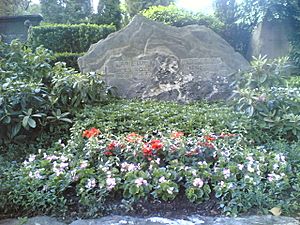
Kiesinger continued to lead the CDU/CSU in opposition (meaning they were not in power) and remained a member of the Bundestag until 1980. In 1971, Rainer Barzel took over as the leader of the Christian Democratic Union. In 1972, Kiesinger gave a major speech to support a vote of no confidence against Willy Brandt's government. This vote was unsuccessful.
In 1980, Kiesinger retired from politics and began working on his memoirs (a book about his life). Only the first part of his memoirs, titled Dark and Bright Years, was finished. It covered his life up to 1958 and was published after his death in 1989. Kurt Georg Kiesinger passed away in Tübingen on March 9, 1988, just before his 84th birthday. His funeral procession was followed by protesters, mostly students, who wanted to remind people of his past membership in the Nazi Party.
Books Written by Kurt Georg Kiesinger
- Schwäbische Kindheit. (“Swabian childhood.”), 1964.
- Ideen vom Ganzen. Reden und Betrachtungen. (“Ideas from the whole. Speeches and reflections.”), 1964.
- Stationen 1949-1969,. (“Stations 1949-1969.”), 1969.
- Die Stellung des Parlamentariers in unserer Zeit. (“The position of the parliamentarian in our time.”), 1981.
- Dunkle und helle Jahre: Erinnerungen 1904–1958. (“Dark and Bright Years: Memoirs 1904–1958.”), 1989.
See also
 In Spanish: Kurt Georg Kiesinger para niños
In Spanish: Kurt Georg Kiesinger para niños
 | Frances Mary Albrier |
 | Whitney Young |
 | Muhammad Ali |


